
I awoke with a pounding headache to the sound of a stranger's voice saying my name. A dim motel room. Unmade beds. Early morning light streaming through half-open blinds. A hazy view of unfamiliar mountains. Commotion in the parking lot outside. For a moment I panicked, unable to recall what events could have led up to this. And then it came back to me: I had volunteered for the support crew of the 600K Brevet. I was in Vermont with the New England Randonneurs, and we had just spent the night at the overnight control - which equaled about three hours of sleep. And compared to the riders we had it easy. After a grueling 237 mile day, a few had already abandoned. Those who remained had 136 more miles to go. The sun was coming up, promising another 97 degree day. The air felt heavy and sticky. The clock was ticking.
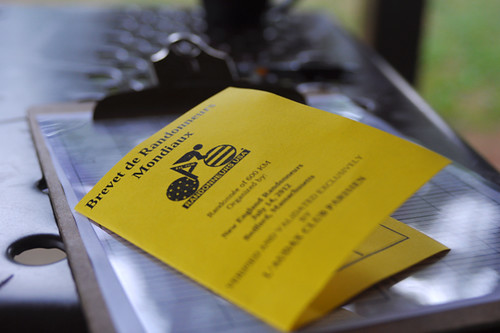
The 600K brevet is a 373.4 mile ride, which the cyclist has 40 hours to complete. In the sport of randonneuring it is the final and longest of a series of 100K, 200K, 300K, 400K and 600K brevets - designed to prepare the rider for the true challenge of the 1,200K grande randonnée, such as the famous Paris-Brest-Paris. PBP is staged every four years, the latest one having just taken place last summer. The next one will be in 2015.
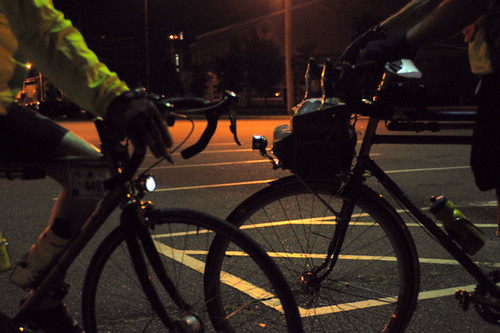
My time with the Randonneurs began at 3:15 on a Saturday morning. When the car pulled up, I was ready and bouncing with excitement. I had with me a floor pump, a bag of food, and what I hoped was a reserve of energy enough to last the next 40 hours on very little sleep. Having gone to bed in the early evening, I had tried to get sufficient rest but was awake shortly after midnight and could not fall back asleep. So I got ready, packed my things and watched Twin Peaks reruns as I waited for Steve. We had never met before, but would keep each other company from now on until this thing was over.
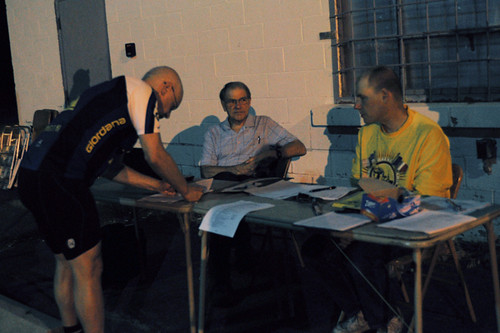
It was still dark when we pulled up to the start - at the Hanscom Field Airbase just outside Boston. It was 3:45am and the riders were arriving. New England Randonneurs president Bruce Ingle was head of support. He had set up the sign-in table, with his father assisting. Our roles as support crew were clearly explained to us. Steve and I would be responsible for two control points - the first we would staff together with Bruce, the second alone. Other than that, it would be a lot of driving and a lot of waiting. We were given paperwork, supplies, instructions. We watched the riders gather.
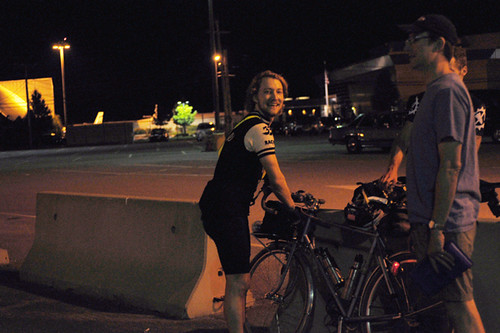
One of the first to arrive was bikey friend Jon Doyle. It was good to see a familiar face. While others were visibly nervous, Jon was smiling and appeared relaxed. In fact, I have never seen him in any mood other than this. Would he make it through his first 600K? I hoped so.

Some riders had arrived at the start on bikes, others by car. Reflective gear was being donned, equipment checked.

Pockets filled with food.
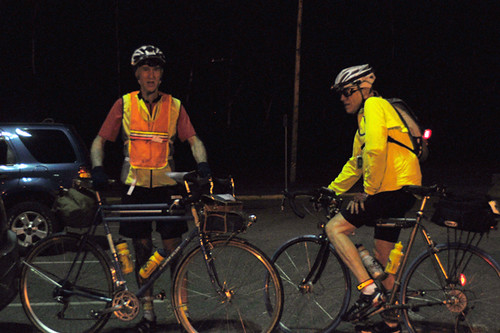
Some had come from as far away as Maine for this brevet.
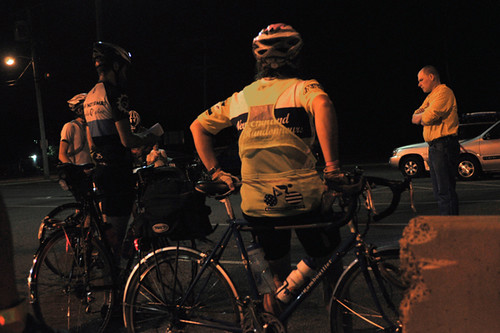
Finally it was time to set off and Bruce went over the rules.

A total of 11 riders began the 600K. I am told the fairly low turn-out was partly due to this being a post-PBP year, partly to there now being two sets of New England Randonneurs brevet series rides - one out of Boston and the other out of Vermont. The Vermont 600K will be in August for anyone who missed this one.

Once the riders were off, we drove to the first control 45 miles away - at Barre Falls Dam in central Massachusetts, the car now loaded to the brim with extra supplies given to us at the start.

Steve is that type of randonneur who thinks of himself as a casual rider, not by any means an athlete. I listened in awe as he described completing his first brevet series followed by Paris-Brest-Paris in the course of a single summer. "Oh, but I barely made the cutoff!" he explained, as if this served as proof of his "just a regular guy" status. Those sneaky randonneurs. Someone who can pedal 1,200 kilometers in the course of a single ride is not a regular guy in my book.
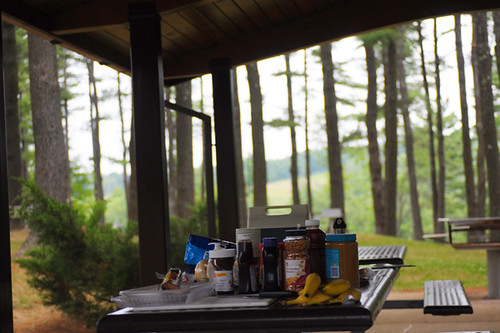
We laid out the food, water, first aid kit, bicycle pumps, garbage bags and other supplies, as we waited for the first riders to arrive. The forest was beautiful, filled with tall pines. The morning air was cool.

This control would be open from 6:07 until 8:48am. We discussed the weather forecast for the day and the types of needs and problems riders were likely to have along the way.

The first arrival was rather unexpected. Having lived in New Hampshire and Maine, I have seen moose a couple of times before - but not this close. This fellow (or lady?) appeared out of the blue and just stood there, then casually meandered into the woods.

Shortly after that, they came. At the first control it seemed like nearly everyone got there at the same time.

The riders were hungry, but happy and full of energy.

At mile 45 everything was going well and no one was having difficulty.

I had my first experience signing control cards. These are yellow cardboard booklets that serve as proof of the riders having completed the entire course of the brevet. Inside is a grid of control point checkboxes. As each rider arrived, my job was to check the time, write it down in the appropriate box, and sign my initials. Not complicated, but it's important that this information gets entered correctly. Often the riders later use it to analyse their performance and make decisions about how to pace themselves on future brevets.

We were also given a clipboard with a list of names of all the riders, where we would enter their in/out times at controls. This allowed us to keep track of where everyone was and how they were doing.

After all the riders had departed, there was no sense of keeping the control open. We loaded the supplies back into the cars and drove to our next check point.

The one that Steve and I would staff was quite a ways off, and so we stopped by the others to say hello. The control set-ups were all different and depended on availability of space. The trick was to set them up next to convenience stores with bathroom amenities. The availability of coffee and ice was a plus.

Some controls were rigged up using open trunks of cars. Others had the luxury of grassy lawns, where they set up tables and umbrellas. Regardless, there was always food, water, a first aid kit, and other supplies available to the riders.

Driving to our control we followed the brevet course, which gave us a good feel for the terrain. Navigation was tricky at times. We used Steve's GPS unit for turn-by-turn directions and the map on my phone for panned out views of the route. When reception was problematic we also made use of the cue sheets. The route took us west all the way across Massachusetts and into New York state. Our own check point would be to the north, on the border with Vermont, right after a difficult climb over a mountain pass. As the day wore on, the temperature and humidity climbed. When it reached 90, we closed the windows and turned on the air conditioning. After an hour in the car I grew unbearably drowsy and used all my energy to stay awake. I felt guilty as I imagined how the cyclists must be feeling around this time. Now and again we passed riders. No longer in one bunch, they were strung out in pairs and singles.
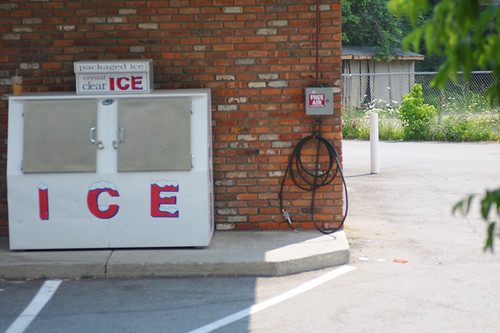
We reached our second control in early afternoon - a rural convenience store with late opening hours. Next to it there was also a pizza place, a sandwich shop and another, 24 hour convenience store. We had permission to set up outside of the non-24 hour store, but not any of the other businesses. Problem was, there was nowhere to set up. The parking lot was crowded and rowdy, with constant motor vehicle movement. There was no safe spot. We would be at this control point for a while - from 2:08pm until 2:24 in the morning, and riders stopping here would likely be exhausted and in need of as many supplies as we could lay out, as well as a quiet, shaded spot to rest.
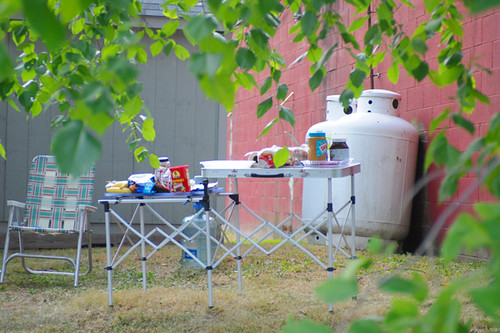
We decided to set up under the only tree around, on a strip of grass in between the two convenience stores, and hope for the best. This was really the only option without having to change control locations. Chairs, coolers, water jugs, boxes of food were laid out as we waited for the first riders. But based on the in/out times we noted at earlier controls, we were not expecting them any time soon. The later in the game in gets, the longer the control points are open. This is in accordance with a formula that has to do with average times and such.

With a long evening ahead of us, Steve and I took turns napping. As I sat awake drinking coffee, I received the first phone call from Bruce, letting us know a rider had abandoned the course. I crossed his name off the roster and we would not expect him at the control. An hour later came a call about a second rider abandoning. The 4 mile 7-8% grade ascent along Petersburg Pass in what was now nearly 100 degree heat and humidity was proving too much even for the experienced randonneurs. It was going to be a tough stretch for them all.

It was not until evening that the lead rider arrived. Dripping wet, but calm and collected, the gentleman was in good spirits. It was a difficult climb in the heat, he confirmed. But he had done it in good time, and was determined to move on swiftly.
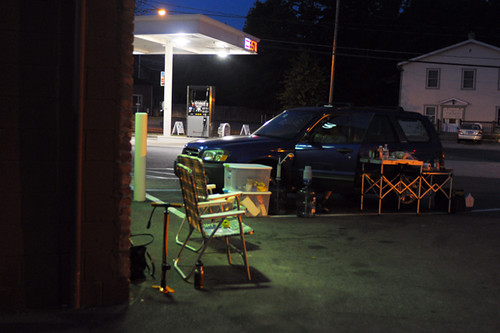
After the lead rider's departure, things were quiet again, save for a small adventure with local police. The manager of the neighbouring convenience store did not like us sitting on the lawn between the two stores and sent the officers to talk to us. The police were nice about it, but we had to move closer to "our" store. Thankfully at this point it had grown dark and the traffic activity in the parking lot subsided. Steve moved his car to a corner spot visible from the road and we set up our supplies alongside. It was not as pleasant here as it had been in our previous spot, but at least the sun had set and there were few other cars around. We continued to wait for riders as the hours passed.
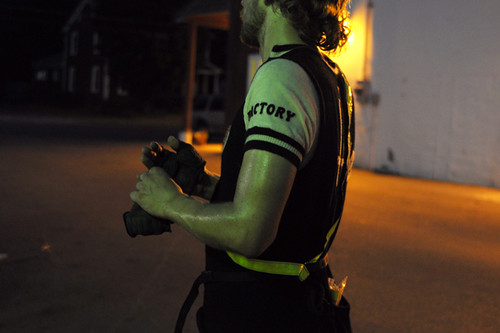
It was after 11pm when they arrived - 4 young riders in close procession. They looked terrible and wonderful at the same time. Glazed-over eyes, drenched in sweat, their movements jerky.

But there was also a delirious excitement about them that was contagious and inspiring.

We plied the disoriented riders with sandwiches, bananas, watermelon. We had to direct them a bit. "Here, why don't you get some water first." "Oh right, good idea."

We were excited for this group having made it this far. Now it was only 30 more miles to the overnight control. At this stage there was plenty of opportunity for them to get some decent sleep before making good time the following morning.
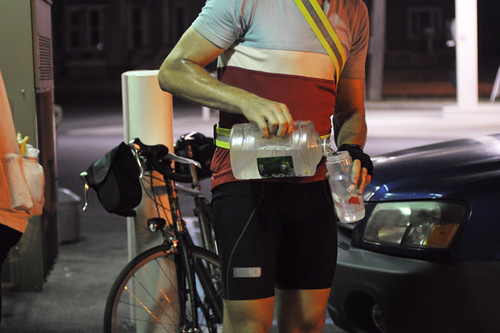
Our supplies were more than sufficient to accommodate everyone. Steve bought some ice at the store to keep the perishable food fresh in the cooler. It is not easy to provide fresh food at controls, but the cooler allowed us to stock cold cuts and tomato juice.

Despite their visible exhaustion, the riders were in a fine mood. I have experienced people behaving tantrumy in similar circumstances and was fully prepared for that, but there was none of it on this brevet. Smiling, small talk, asking about how the others were doing. A class act. Having rested a bit, the guys got back on their bikes and disappeared into the night.
Shortly before midnight the convenience store shut off their outside lights. In the dark we waited for the others. With two of the 11 riders having abandoned and 5 having just come and gone, we were still expecting 4 more to come through. Just after midnight I received another phone call that reduced that number to two. And then nothing. After 1am I began to worry. The riders had a contact number to call in case of emergency, but what if their phones had run out of batteries or they could not get reception? With the control only open for another hour, I hoped they weren't in trouble. Steve and I stood in the middle of the dark country road watching for headlights in the distance. "I think I can see them! ...No, false alarm." Shortly before 2am we finally did see a real headlight - just one. The lanky gentleman dismounted his double-top tube bike with trembling limbs as sweat poured off him in streams. He was fine, but his friend had stayed behind - sick and unable to continue after having crossed the mountain pass. Was there any chance we could pick him up in the car? Arranging for his own ride would mean a 3 hour wait in the dark.

And so 7 of the 11 riders remained. The gentleman who was now with us had, unfortunately, not left himself much of a time cushion and we hoped he would be able to finish. After watching him ride off, Steve reshuffled the contents of his car to make room for a third passenger and a bike while I phoned the stranded rider and managed to get his coordinates. We retraced the previous 15 miles of the route along pitch black country roads and retrieved the gentleman and his bike. He wasn't well, but would be all right after some rest. After finally making our way to the overnight control point, the last thing I recall is climbing into a random bed at 4:30am. Then blankness.

Our duties technically done, we headed back from Vermont at 7:30 on Sunday morning. We planned to stop at the finish and watch the first riders arrive. The drive back was exhausting and I could not keep awake. I felt hungover and somewhat deflated. And for the first time, I started to imagine myself doing the course in the future. It was a weak feeling, prompted possibly by guilt at being so tired when I wasn't even riding. But until then, I did not think I was at all interested in doing a ride like this myself. Now the sentiment had changed to maybe.

On the way back to Boston, we stopped at another control to conduct a bag exchange. The timing of this is something I still don't entirely understand, but basically riders can leave things at the start and at certain controls to retrieve them later.

Here we also saw Matt - feverish with exhaustion, his eyes aglow and his hands shaking. In between sandwich bites, he was lucid enough to tell me about the beautiful French bike he was riding. Matt works for Bikes Not Bombs and refurbished the vintage machine himself. This was his first attempt at a 600K brevet. It was clear to me then that he would finish. He had to.

By mid-morning we crossed back into Massachusetts and at length arrived at the finish - back at Hanscom Field Airbase. How different it all looked in the mid-day sun.
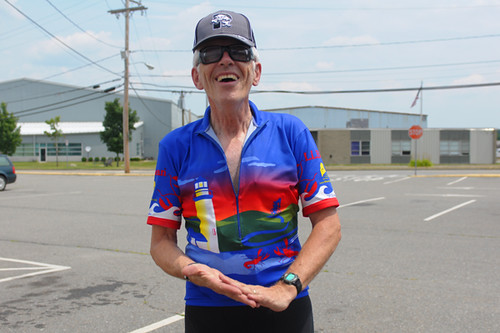
The rider whom we'd picked up overnight had hitched a ride in one of the larger support vehicles and was feeling much better.
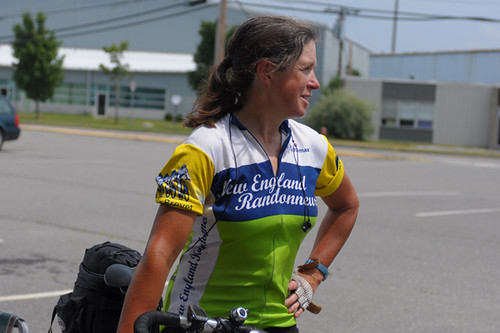
Melinda Lyons was also there. An experienced and distinguished randonneur, she was among the riders who'd abandoned the previous day. As Melinda put it, her status was NHF: not having fun. Somewhere along the Petersburg Pass, she determined the heat was too much for her in a year when she was really doing the brevet just for the heck of it. Having found a motel room on her own, she got some sleep and cycled back in the morning.
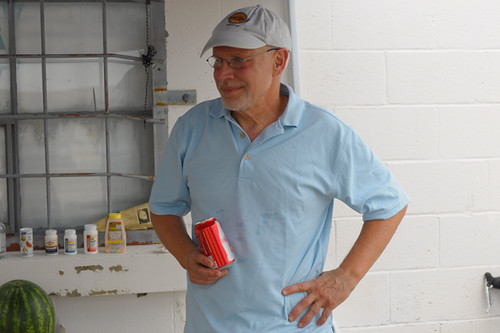
And then I saw Ernie: Consistently in the lead throughout the brevet, he was the first to finish and looked fresh as a cucumber. I was also happy to learn that Stephen - the last of the riders to have arrived at our late-night control - had finished against the odds, with less than an hour to spare before the cutoff. The other remaining riders had finished as well: 7 of the original 11 completed the 600K brevet out of Boston.

My small role in the brevet helped me understand how these events work, and, moreover, how much time and effort go into organising them. Mapping out the routes, recruiting and coordinating the support crew, arranging for car-pools, establishing control points, sourcing food and supplies, keeping the lines of communication open, keeping track of the riders - these things are crucial in ensuring a safe and positive experience for brevet participants. Perhaps some day I will take part in a sanctioned randonneuring event, perhaps not. I don't know whether I have what it takes - not only to make it physically, but to maintain composure and a positive disposition throughout, the way these lovely people did. Either way, I'd like to help out again when my schedule allows. These events need support volunteers, and anyone interested can contact their local randonneuring organisation for information.
Though this report was written from a non-rider perspective, I hope it shed some light on what long brevets are like. Congratulations to all who completed and took part in the Boston 600K! More pictures here. And see also this post about the riders' bikes.


 No one likes smelly shoes at the crag, so the Caronas took a hit from the front load washing machine, along with some volleys. They look gorgeous again and ready for summer climbing.
No one likes smelly shoes at the crag, so the Caronas took a hit from the front load washing machine, along with some volleys. They look gorgeous again and ready for summer climbing. 



 Today Eustacia Vye (my Pashley Pricess) met up with her new friend Frida, the fetching Batavus Fryslan that belongs to Margonaute of ZOMGBicycles.
Today Eustacia Vye (my Pashley Pricess) met up with her new friend Frida, the fetching Batavus Fryslan that belongs to Margonaute of ZOMGBicycles. Margo and I tagged along and sat at an outdoor cafe while the bikes frolicked nearby.
Margo and I tagged along and sat at an outdoor cafe while the bikes frolicked nearby. The Batavus Fryslan is a very pretty and comfortable bike. It is a higher-end model than the Old Dutch I tested last summer. It was getting dark and impossible to take decent shots, but Margo has more pictures of this bicycle on her weblog. Especially nice are the shots from last weekend's Tweed Ride - Frida looked so elegant with her owner's stunning outfit!
The Batavus Fryslan is a very pretty and comfortable bike. It is a higher-end model than the Old Dutch I tested last summer. It was getting dark and impossible to take decent shots, but Margo has more pictures of this bicycle on her weblog. Especially nice are the shots from last weekend's Tweed Ride - Frida looked so elegant with her owner's stunning outfit!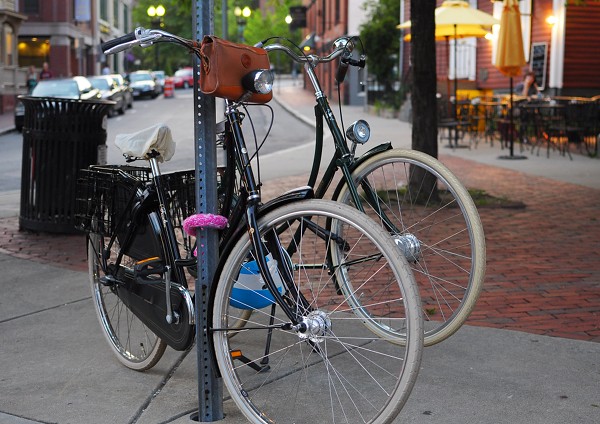 Despite their differences in wheel size (28" on the Batavus Fryslan vs. 26" on the Pashley Princess), we were surprised to note how similar Frida and Eustacia looked, including their overall proportions. My handlebars are set quite a bit lower, but that was an intentional modification on my part. Margo prefers hers higher. The bicycles also have matching cream tires, matching Brooks B66S saddles, and matching Wald rear folding baskets. So cute to see them together like this!
Despite their differences in wheel size (28" on the Batavus Fryslan vs. 26" on the Pashley Princess), we were surprised to note how similar Frida and Eustacia looked, including their overall proportions. My handlebars are set quite a bit lower, but that was an intentional modification on my part. Margo prefers hers higher. The bicycles also have matching cream tires, matching Brooks B66S saddles, and matching Wald rear folding baskets. So cute to see them together like this!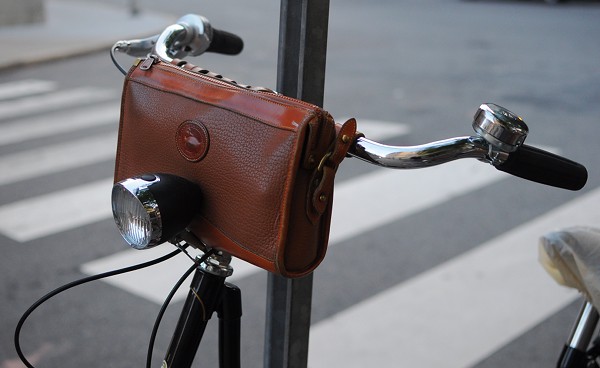 One really cool thing about Frida is the DIY handlebar bag. It is a small leather purse, with the strap wrapped around the flat part of the bars.
One really cool thing about Frida is the DIY handlebar bag. It is a small leather purse, with the strap wrapped around the flat part of the bars.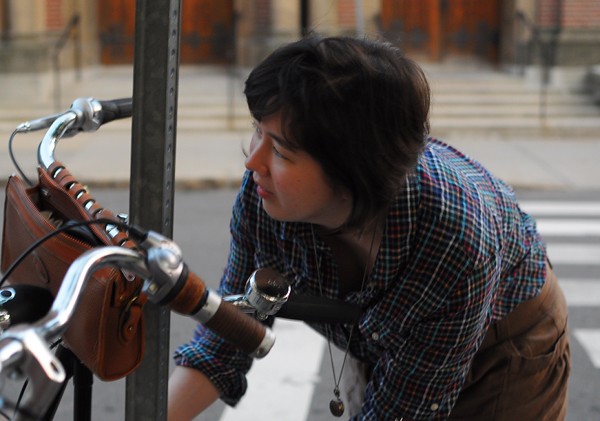 Here you can see the handlebar attachment. A simple and elegant idea that shows you don't necessarily need to spend tons of money on bike-specific accessories.
Here you can see the handlebar attachment. A simple and elegant idea that shows you don't necessarily need to spend tons of money on bike-specific accessories.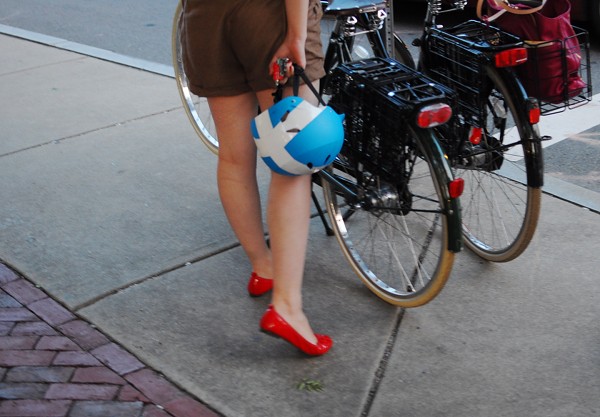 At the end of the evening, Margo test-rode my bike while I carefully tried hers on for size (Frida is new and I was too worried about her well-being to ride her on the street).
At the end of the evening, Margo test-rode my bike while I carefully tried hers on for size (Frida is new and I was too worried about her well-being to ride her on the street).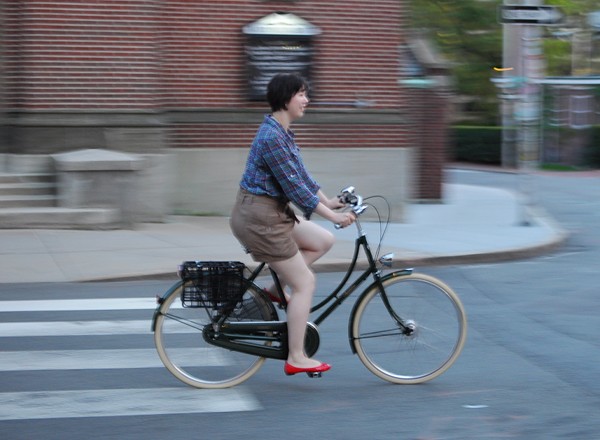 Margo on my Pashley. She is slightly taller than I am, so ideally the saddle would be raised.
Margo on my Pashley. She is slightly taller than I am, so ideally the saddle would be raised.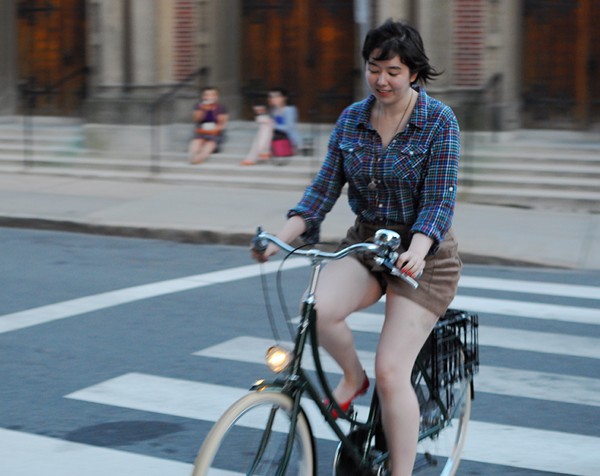 My own impression is that the fit of the two bikes is similar, but the Batavus has somewhat more relaxed angles. Weight-wise, the Batavus is a bit heavier. They are both nice bikes, with the main differences being the fork crowns, the wheel size, the lighting systems, and the shape of the handlebars. If you are choosing between a Pashley and a Batavus, I'd really suggest test-riding each.
My own impression is that the fit of the two bikes is similar, but the Batavus has somewhat more relaxed angles. Weight-wise, the Batavus is a bit heavier. They are both nice bikes, with the main differences being the fork crowns, the wheel size, the lighting systems, and the shape of the handlebars. If you are choosing between a Pashley and a Batavus, I'd really suggest test-riding each. Here is to lovely bicycles and to lovely bicycle friendships!
Here is to lovely bicycles and to lovely bicycle friendships!
 Tuffee is our Border Collie. She was 6 years old as of Feb. 15. As you may know BC's are herding dogs. So Tuffee is determained to herd our horses since we don't have any sheep. In this photo she is trying to herd Sundance, my paint gelding. But horses don't herd as well as sheep do. So instead of moving like Tuffee wants him to do. He will just stand there and once in a while raise a back hoof to threaten her or to tell her to leave him alone. When she botheres him to much he will make a half hearted kick at her. He has been known to actually kick her enough to make her yelp but never enough to actually hurt her. So Far. And I hope he never does. Two of our other horses, Nita and Star treat her the same way. But Trave, one of the ponies will only take her "herding" so long and then he will charge at her and try to stomp her with his front hooves. The dumb dog doesn't seem to learn not to bother the horses. Maybe it is her way of finding adventure in an otherwise dull life. When I see she has bugged him enough I tell her to get OUT. She knows that means to leave him alone and get out of his pen. I am glad she only trys to herd the horses when I am out in the pen with them. She never goes in their pens when I am not in there.
Tuffee is our Border Collie. She was 6 years old as of Feb. 15. As you may know BC's are herding dogs. So Tuffee is determained to herd our horses since we don't have any sheep. In this photo she is trying to herd Sundance, my paint gelding. But horses don't herd as well as sheep do. So instead of moving like Tuffee wants him to do. He will just stand there and once in a while raise a back hoof to threaten her or to tell her to leave him alone. When she botheres him to much he will make a half hearted kick at her. He has been known to actually kick her enough to make her yelp but never enough to actually hurt her. So Far. And I hope he never does. Two of our other horses, Nita and Star treat her the same way. But Trave, one of the ponies will only take her "herding" so long and then he will charge at her and try to stomp her with his front hooves. The dumb dog doesn't seem to learn not to bother the horses. Maybe it is her way of finding adventure in an otherwise dull life. When I see she has bugged him enough I tell her to get OUT. She knows that means to leave him alone and get out of his pen. I am glad she only trys to herd the horses when I am out in the pen with them. She never goes in their pens when I am not in there.










































